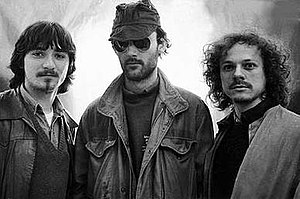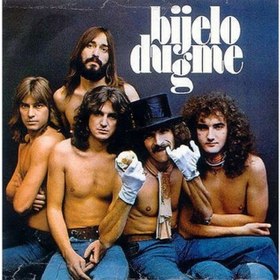Yugo Rock 201: The Punk Scene
We've had several "classes" on the ex-Yu rock scene from New Primitivism to topics on some of the greatest bands; however, there is a (sometimes) overlooked aspect on Yugo-Rock, the punk scene.
What was the punk scene all about anyway?
Just like the Brits had a massive punk-new wave scene in the late 70s/early 80s, so did former Yugoslavia. In fact, the punk scene of the former Yugoslavia ran in tandem with the Brit punk-new wave scene. It was also comprised mostly of Croatian artists. This posting will give the simplest possible overview of them.
Azra

A power trio started in 1977 by then twenty-four-year-old Branimir "Johnny" Shtuljic, the band is seen as one of the most influential in the Yugoslav new wave scene. In 1979 they released "Balkan," backed with A Shta da Radim ("Oh What Shall I Do?") Their 1980 debut earned them critical praise, but after dropping their third record in 1987, Shtuljich split the band. Their name comes from a verse of "Der Asra" by German poet Heinrich Heine. For a time in 1977-78, Azra were a bigger band featuring vocalist Jura "Jupiter" Stublich, guitarist Mladen Jurchich bass player Marino Pelajic, and drummer Branko Hormantko after Stublich was denied his chance to become the lead singer of Aerodrom (The Airport) because of his deep vocals. This setup only survived about six months before Shtuljich decided to revert to a power trio; however his four ex-bandmates would go on to become...
Film

Another important part of the Yugoslav new wave-punk scene, Film got their taste of fame at the national level in the early 1980s. They dropped their 1981 debut Novo Novo! Josh Juche Samo na Filmu, a danas u Vashoj Glavi (Extra Extra! Since Yesterday Only on Camera, but Today In Your Heads) was a massive hit with the ska-heavy lead single - "Neprilagodjen," (Misfit). The success of their debut led to them being invited to play at the popular club Kulushich in downtown Zagreb, Croatia and a live record caputring the show was out the following year.
Film's next record, Zona Zumraka ("The Twilight Zone," sorry Golden Earring) of 1982, saw a changeover to mainstream rock. It does, however, have an interesting instrumental of the James Bond Theme. Since then the band converted slow to a more mainstream rock format and even had traces of Heartland Rock in their music a la Bruce Springsteen, Tom Petty, and a small trace of R.E.M.
Prljavo Kazalishte
The band was formed in 1977 by guitarist and songwritter Jesenko Haura and was eventually expanded to include Davorin Bogovich on vocals and Tihomir Filesh on drums. Their name is derived from an episode of the popular Italian comic Alan Ford.
As previously stated in this blog, their logo is very simillar to that of the Rolling Stones. Their first few records were rooted in punk and new wave in particular their 1980 record Crno Bijeli Svijet (The Black-and-White World). Since then the band adopted a brief "Heavy metalish" period with their smash hit eventually turned live album title Sve je Lako Kad si Mlad ("Everything's Easy When You're Young)," but went more pop rock by the time their 1986 record, Zlatne Godine (The Golden Years) was out and Mladen Bodalec became lead vocalist.
With the distablizing political atmosphere, the band recorded several anti-war hits in the 90s most notabely Lupi Petam (Stomp Your Heals).
Bijelo Dugme

While BD had spent most of their career in the 1970s with progressive rock and blusey arrangements, two of their albums Bitanga i Princeza (The Brute and the Princess - 1979), and ESPECIALLY Dozibjeti Stotu (Live to 100) in 1980 show their new wave style in full.

Take a look at the Mirko Ilich designed cover of their 1980 album Dozivjeti Stotu. The cover, which existed in three different versions, shows that the band made a massive overhaul. They cut their hairs and began experimenting more with synthesizers all in an effort to look and sound "in" with the trend of the day. Even lead singer Zeljko Bebek lost his signature mustache. This record was also unique as it was carved during recording sessions unlike their other albums, which were written in the months leading up to recording.
Legacy
There is a 2003 documentary, entitled Sretno Djete ("The Happy Child)," named after same named Prljavko Kazalishte hit. The documentary showcases the influences leading up to the New Wave-Punk Scene, and the events that led up to it. Of all the bands described, Azra was named the most influential.

Comments
Post a Comment